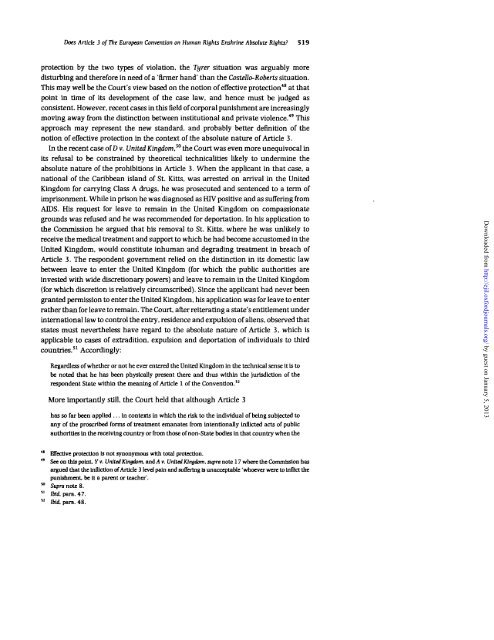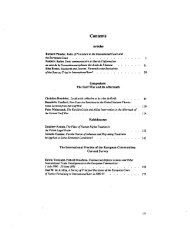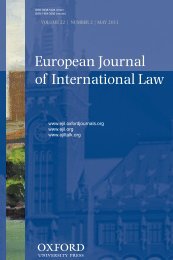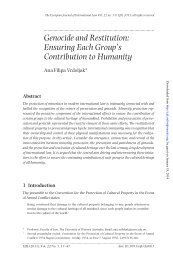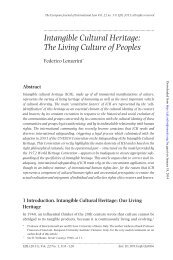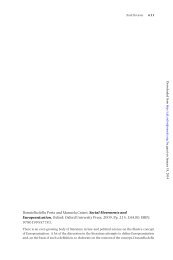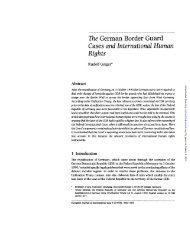Does Article 3 of The European Convention on Human Rights ...
Does Article 3 of The European Convention on Human Rights ...
Does Article 3 of The European Convention on Human Rights ...
Create successful ePaper yourself
Turn your PDF publications into a flip-book with our unique Google optimized e-Paper software.
<str<strong>on</strong>g>Does</str<strong>on</strong>g> <str<strong>on</strong>g>Article</str<strong>on</strong>g> 3 <str<strong>on</strong>g>of</str<strong>on</strong>g> <str<strong>on</strong>g>The</str<strong>on</strong>g> <str<strong>on</strong>g>European</str<strong>on</strong>g> <str<strong>on</strong>g>C<strong>on</strong>venti<strong>on</strong></str<strong>on</strong>g> <strong>on</strong> <strong>Human</strong> <strong>Rights</strong> Enshrine Absolute <strong>Rights</strong>? 519<br />
protecti<strong>on</strong> by the two types <str<strong>on</strong>g>of</str<strong>on</strong>g> violati<strong>on</strong>, the Tyrer situati<strong>on</strong> was arguably more<br />
disturbing and therefore In need <str<strong>on</strong>g>of</str<strong>on</strong>g> a 'firmer hand' than the CosteUo-Robcrts situati<strong>on</strong>.<br />
This may well be the Court's view based <strong>on</strong> the noti<strong>on</strong> <str<strong>on</strong>g>of</str<strong>on</strong>g> effective protecti<strong>on</strong>' 18 at that<br />
point in time <str<strong>on</strong>g>of</str<strong>on</strong>g> its development <str<strong>on</strong>g>of</str<strong>on</strong>g> the case law, and hence must be judged as<br />
c<strong>on</strong>sistent However, recent cases in this field <str<strong>on</strong>g>of</str<strong>on</strong>g> corporal punishment are Increasingly<br />
moving away from the distincti<strong>on</strong> between instituti<strong>on</strong>al and private violence. 49 This<br />
approach may represent the new standard, and probably better definiti<strong>on</strong> <str<strong>on</strong>g>of</str<strong>on</strong>g> the<br />
noti<strong>on</strong> <str<strong>on</strong>g>of</str<strong>on</strong>g> effective protecti<strong>on</strong> In the c<strong>on</strong>text <str<strong>on</strong>g>of</str<strong>on</strong>g> the absolute nature <str<strong>on</strong>g>of</str<strong>on</strong>g> <str<strong>on</strong>g>Article</str<strong>on</strong>g> 3.<br />
In the recent case <str<strong>on</strong>g>of</str<strong>on</strong>g> D v. United Kingdom, 50 the Court was even more unequivocal in<br />
its refusal to be c<strong>on</strong>strained by theoretical technicalities likely to undermine the<br />
absolute nature <str<strong>on</strong>g>of</str<strong>on</strong>g> the prohibiti<strong>on</strong>s in <str<strong>on</strong>g>Article</str<strong>on</strong>g> 3. When the applicant in that case, a<br />
nati<strong>on</strong>al <str<strong>on</strong>g>of</str<strong>on</strong>g> the Caribbean island <str<strong>on</strong>g>of</str<strong>on</strong>g> St Kitts, was arrested <strong>on</strong> arrival in the United<br />
Kingdom for carrying Class A drugs, he was prosecuted and sentenced to a term <str<strong>on</strong>g>of</str<strong>on</strong>g><br />
impris<strong>on</strong>ment While In pris<strong>on</strong> he was diagnosed as HTV positive and as suffering from<br />
AIDS. His request for leave to remain in the United Kingdom <strong>on</strong> compassi<strong>on</strong>ate<br />
grounds was refused and he was recommended for deportati<strong>on</strong>. In his applicati<strong>on</strong> to<br />
the Commissi<strong>on</strong> he argued that his removal to St. Kitts, where he was unlikely to<br />
receive the medical treatment and support to which he had become accustomed in the<br />
United Kingdom, would c<strong>on</strong>stitute inhuman and degrading treatment In breach <str<strong>on</strong>g>of</str<strong>on</strong>g><br />
<str<strong>on</strong>g>Article</str<strong>on</strong>g> 3. <str<strong>on</strong>g>The</str<strong>on</strong>g> resp<strong>on</strong>dent government relied <strong>on</strong> the distincti<strong>on</strong> in its domestic law<br />
between leave to enter the United Kingdom (for which the public authorities are<br />
Invested with wide discreti<strong>on</strong>ary powers) and leave to remain in the United Kingdom<br />
(for which discreti<strong>on</strong> is relatively circumscribed). Since the applicant had never been<br />
granted permissi<strong>on</strong> to enter the United Kingdom, his applicati<strong>on</strong> was for leave to enter<br />
rather than for leave to remain. <str<strong>on</strong>g>The</str<strong>on</strong>g> Court after reiterating a state's entitlement under<br />
internati<strong>on</strong>al law to c<strong>on</strong>trol the entry, residence and expulsi<strong>on</strong> <str<strong>on</strong>g>of</str<strong>on</strong>g> aliens, observed that<br />
states must nevertheless have regard to the absolute nature <str<strong>on</strong>g>of</str<strong>on</strong>g> <str<strong>on</strong>g>Article</str<strong>on</strong>g> 3, which is<br />
applicable to cases <str<strong>on</strong>g>of</str<strong>on</strong>g> extraditi<strong>on</strong>, expulsi<strong>on</strong> and deportati<strong>on</strong> <str<strong>on</strong>g>of</str<strong>on</strong>g> individuals to third<br />
countries. 51 Accordingly:<br />
Regardless <str<strong>on</strong>g>of</str<strong>on</strong>g> whether or not he ever entered the United Kingdom In the technical sense It Is to<br />
be noted that he has been physically present there and thus within the Jurisdicti<strong>on</strong> <str<strong>on</strong>g>of</str<strong>on</strong>g> the<br />
resp<strong>on</strong>dent State within the meaning <str<strong>on</strong>g>of</str<strong>on</strong>g> <str<strong>on</strong>g>Article</str<strong>on</strong>g> 1 <str<strong>on</strong>g>of</str<strong>on</strong>g> the <str<strong>on</strong>g>C<strong>on</strong>venti<strong>on</strong></str<strong>on</strong>g>. 51<br />
More importantly still, the Court held that although <str<strong>on</strong>g>Article</str<strong>on</strong>g> 3<br />
has so far been applied ... In c<strong>on</strong>texts in which the risk to the individual <str<strong>on</strong>g>of</str<strong>on</strong>g> being subjected to<br />
any <str<strong>on</strong>g>of</str<strong>on</strong>g> the proscribed forms <str<strong>on</strong>g>of</str<strong>on</strong>g> treatment emanates from Intenti<strong>on</strong>ally Inflicted acts <str<strong>on</strong>g>of</str<strong>on</strong>g> public<br />
authorities In the receiving country or from those <str<strong>on</strong>g>of</str<strong>on</strong>g> n<strong>on</strong>-State bodies In that country when the<br />
41 Effective protecti<strong>on</strong> Is not syn<strong>on</strong>ymous with total protecti<strong>on</strong>.<br />
** See <strong>on</strong> this point, Y v. United Kingdom, and A v. United Kingdom, supra note 17 where the Commissi<strong>on</strong> has<br />
argued that the inflicti<strong>on</strong> <str<strong>on</strong>g>of</str<strong>on</strong>g> <str<strong>on</strong>g>Article</str<strong>on</strong>g> 3 level pain and suffering is unacceptable 'whoever were to inflict the<br />
punishment, be it a parent or teacher'.<br />
50 Supra note 8.<br />
" Ibid, para. 47.<br />
u Ibid. para. 48.<br />
Downloaded from<br />
http://ejil.oxfordjournals.org/<br />
by guest <strong>on</strong> January 5, 2013


